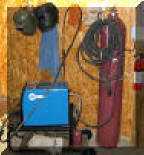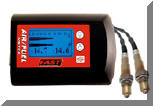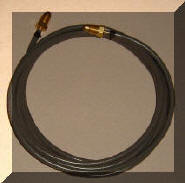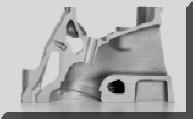|
This Ad Helps Bring You
Free Information on Welding Race Cars & Street Rods
Have a Welder? Improve Weld Starts and
Have Shielding Gas Cylinder Last at Least Twice as Long!
Note: Our Patented
GSS
is Not Available in "Stores"

A home shop fabricator
in Georgia with a Miller TM 175 amp welder
purchased a 50 foot Gas Saver System ( GSSTM
) so he could use a larger cylinder
and mount it on the wall of his shop. He wrote:
"The system works great.
Thanks for the professional service and
a great product."
Click To See His Home Shop
A Professional
Street Rod Builder Had This to Say:
With their standard MIG welder gas delivery hose the
peak shielding flow at weld start was measured at 150 CFH. That caused air
to be sucked into the gas stream causing poor weld starts. With the
GSS replacing their existing
hose, the peak flow surge at the weld start was about 50 CFH. Total gas use
was cut in half.
Kyle Bond, President, quickly saw the improvement
achieved in weld start quality as a significant advantage! Kyle, an
excellent automotive painter, was well aware of the effects of gas surge
caused by pressure buildup in the delivery hose when stopped. He has to
deal with the visible effects in the air hose lines on the spray gun in his
paint booth! The paint surge is visible and creates defects unless the gun
is triggered off the part being painted! We can’t do that with our MIG gun!
|
|
Air/Fuel Meter
The Air/Fuel Meter was the salvation for quantifying the problems with the
Vacuum Secondary Carb. It also made setting up the Double Pumper much
quicker and with a high degree of certainty that it was optimized for cruising
as well as delivering maximum performance. The meter reads the oxygen
sensor output that was installed in the header collector. It is relatively
inexpensive and worth the price. Both the meter and the sensor
were purchased from the same company, (see suggestion below).
Once installed, while in the process of fine tuning the Vacuum Secondary Carb, the solution
were obvious. Use a Double Pumper!! The
following are pictures of the meter and bung for the oxygen sensor that was
welded into
one exhaust header collector. It is
only installed on the steering column when testing. The oxygen sensor is
replaced with a spark plug to seal the hole when not in use (thread size is
the same and it can take the heat).
|
|
The Air/Fuel Meter has 10 colored LED bars ranging from about
11 to 12:1 Air/Fuel on the rich side to about 17:1 Air/Fuel on the lean side.
It is most accurate in the center at a stoichiometric ratio of 14.7. Since
we are mostly interested in achieving a slightly rich mixture, the inaccuracies
of the measurements at the extremes are less important.
The following table gives the
approximate air/fuel ratio's for the 10 LED's:
|
|
Color |
red |
red |
light green |
light green |
dark green |
dark green |
light green |
light green |
red |
red |
|
Ratio |
~11.5 |
~12 |
~12.5 |
~13 |
14 |
15 |
~16 |
~16.5 |
~17 |
~17.5 |
|
There are broader range sensors and
meters which can be used but these systems are 5 to 10 times the price (see
below) and this
combination provides good readings in the range where they are needed. Now
if your going to use a fuel injection system and use your laptop to set up the
fuel map etc,.... but then why would you want to do that for
your street rod! Isn't that why your using a carb to get away from
computers controlling your car? Don't get me wrong PC's are great. I
had one of the first PC's, a Radio Shack Level I then a Level II then an IBM XT when they cost $3500!!
They are fine for producing web sites but not needed to run your street rod!
Although come to think of it, micro's probably operate the communications to the remote
doors and windows, the stereo
system, digital dash and CD ignition. Guess we can't get away from them
entirely!
 If you want to spend
big bucks, one of the latest wideband oxygen sensor systems from FAST
TM
uses two O2
sensors, one for each bank! It features a built-in data logger
with on-screen playback. You can even connect to your laptop. It sells for just
over $600. If you want to spend
big bucks, one of the latest wideband oxygen sensor systems from FAST
TM
uses two O2
sensors, one for each bank! It features a built-in data logger
with on-screen playback. You can even connect to your laptop. It sells for just
over $600.
"Now let's see, is that whole left bank running
slightly rich or is it only those back two cylinders? If they only had one with 8
oxygen sensors small enough to fit into each header pipe, then I could tell if changing the rear left jet would......"
Click here or the Picture to link to the
FAST
web site.
|
|
The final setting on the Double Pumper provides a slightly rich mixture
(about 13:1) at idle and cruise. It could be adjusted to run slightly leaner
for better fuel mileage but for better cooling and reliability reasons it is set at
that level. Upon rapid acceleration it is now possible to keep the mixture
just slightly richer. That assures we are not getting into a lean situation. A carburetor
can not provide as uniform a mixture distribution as EFI. Therefore its
advisable to keep the leanest cylinder somewhat on the rich side which will
cause the oxygen sensor, which averages them all (the four on the side where it
is placed) to be richer than optimum. With the Vacuum Secondary Carb it would reach into the
17:1 area and create a lean Bog for about 1 second. The meter reacts
instantly when the throttle is opened. Those 2 x 50CC pumps prevent it from
going lean and there is no evidence that it two rich when running. No fouled plugs or
stumbling after a quick stab of the throttle then backing off. Only if
that quick stab is when starting!
For an inexpensive system,
www.SummitRacing.com offers:
Digital Air/fuel Gauge, Part #
SUM-G2986 for $27.95
O2 Sensor, Part #
SUM-G2989 for $29.95
Weld-in BUNG for O2
Sensor, Part # SUM-G2990 for $4.49
|
|
( Note:
Thanks to those "Car Crazy" folks who have purchased
the Gas Saver System and commented on the improved starts and reduced gas usage
they have achieved. Many purchased our 6 foot prefitted GSS,
Part Number WAT FB6.
We also have 3 and 4 foot prefitted GSS,
Part Number WAT-FB3, FB4 )
If your MIG welding, check out our low cost Gas Saver
System. It improves weld starts. For the
numerous short welds and tack welds made in
this
type construction it could save you over 50% of your shielding gas usage.
Click Here.
|
|

MIG Gas Delivery and the Small Block Chevy
Evolved in a Similar Way and Time!
Both
had Advances and Setbacks Before
They Were Optimized! 
Click
for a PDF Report on the Similarities |
| |
▲HOME
►GSS
PRODUCTS
Return to
Modifying Holly Page, Bottom Line or Go To
|